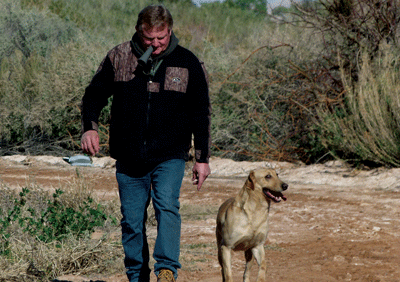By STEPHANIE BUNKER
Moapa Valley Progress

The happiest dogs to be found anywhere were the ones at the Overton Wildlife Management Area (OWMA). The Las Vegas Hunting and Retrieving Club hosted an American Kennel Club Hunt Test last weekend. Tails were wagging and tongue’s falling out as the Labradors were practically grinning from ear to ear in excitement.
“Look at that dog right there, it’s messing up big time but it’s having the funnest time doing it,” said participant Steve Miller as he was watching one of the runs.
A total of 132 retrieving dogs; including Labradors, Golden Retrievers, Chesapeak Bay, and Flat Coat dogs; were entered into the AKC Hunt Test. All ranges in levels of difficulty and age were included. The youngest dog to be entered was only 6 months old and the oldest dog was 10 years old.
The sport engages the canine with its innate instinct of retrieving water fowl. There are three levels for the dogs to pass before becoming the top title of a Master Hunter.
The first level is the Junior, which is usually for young dogs that simply need to see a bird drop on the ground, go out and bring it back to their handler. In the trals, this exercise must be done on water and on land.
The Senior level of dogs are expected to retrieve two birds they have seen drop and bring back to their handler as well as retrieve a “blind” bird. The blind is where the dog has not seen where the bird dropped and is directed to it through trust and training by the handler’s hand signs and whistle. The dog must do these tasks in both the land and again on the water to pass the level.
The most difficult tier of Master level is for those more experienced dogs that are on average about 3 or 4 years old. In this category the dog must retrieve 3 birds that they have seen drop as well as retrieve a blind bird. In this level they have to pass the test over land, and do it again over water, then do it a final time in a combination of land and water. They also test the ability of the dog to control itself by commanding it to sit next to its handler and watch the working dog complete its test. If the “honor dog” breaks its position then it no longer qualifies for the title.
Saturday’s tests were all done on land; the dog must pass the test on land in order to progress into the next phase of water. Saturday night the LVHRC held a catered banquet at the Senior Center where they awarded each dog that passed with a ribbon.
On Sunday they focused on completing the water portion of the trials.
LVHRC President, Jessie Broadway, said that the hunt test ran smoothly but the tasks were challenging.
“There were not as many dogs that passed in this test,” Broadway said.
“But it’s the start of the season and if they didn’t qualify, then it’s a good training lesson.”
Broadway added that there were several dogs entered into the test that are not only working dogs but show dogs as well. “It shows their versatility of beauty and brawn,” she said.
The weather for the test was enjoyable for the participants who came from all over the country. “Some from Idaho and Utah came through snowstorms to get here,” Broadway said. “One judge from Orville came through flooding, so we have been bragging up the warm weather here.”
Broadway also said that the water at the OWMA was perfect, “The water is great here, and every one of the dogs loved the water.”
Brent Beatty, the handler that possibly traveled the farthest, came from Oklahoma.
“I like to take 2 trips a year somewhere far away.” Beatty said. “I didn’t think I would ever come to the desert to run dogs.”
Beatty made the journey with 4 dogs in tow. Three of the dogs belong to him and the 4th he was handling for a friend that could not attend. Beatty had one dog running in the Junior level but the other 3 were all running in the Master level. His dog Bullet was the youngest Labrador in the nation to pass the Master level at only 19 months.
Steve Miller from Mapleton Utah ran his rescued Labrador in the Master level. “It’s fun to see what the dogs are capable of,” Miller said. “There is a lot of work and reliability on the dog’s part.”
Miller explained that his wife rescues dogs. She brought home this 6 month Labrador puppy that connected with him. Miller decided to train Gunner and give him a title to show others that rescue dogs are capable too and they don’t need an impressive pedigree to earn a title. After they attained the Senior title he figured he might as continue on to the Master title as well.
“He is my buddy and he is a duck dog,” said Miller.
Some may have travelled far to come to Moapa Valley, but there is one family that stayed close to home. Paul Leavitt from Moapa ran his dog named Silver Moose in the Master level of the hunt test.
Silver Moose was trained by Leavitt himself and this was the first time he and his dog have attempted the Master level. Following his run he said, “My nerves got the best of my dog but it was a fun test for the first try.”
Whether the dogs passed their test or not, all would agree that they learned more and had fun outside on a beautiful weekend.










